Month 11:22, Week 3:7 (Shibi'i/Sukkot), Year:Day 5945:317 AM
2Exodus 8/40
Gregorian Calendar: Monday 24 January 2022
Book of Revelation VII
The 7 Asian Assemblies - 1. Ephesus
(Revelation 2:1-7)
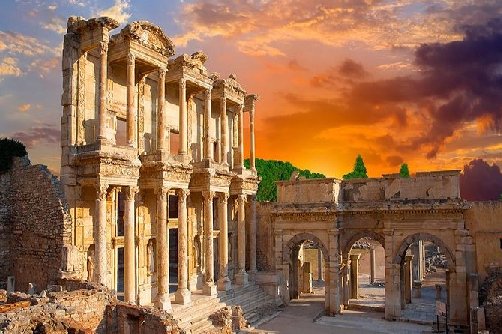
Continued from Part 7
Introduction
Shabbat shalom kol beit Yisra'el and Mishpachah and welcome back to the seventh part on our study of the Book of Revelation.
Recapitulation - Establishing the Divinity of Messiah
Last week we looked at Revelation 1:9-20 which records the incredible theophany or manifestation of the glorified Christ to the apostle John with its echoes of the Book of Daniel and we find ourselves gazing at the form, and into the radiant face ablaze with fire, of Elohim (God) Himself, the Son of Man, the Lesser Yahweh. Not since the transfiguration, when the glory of Messiah was first revealed to man through the three presiding apostles (Peter, James and John) (Mt.17:1-13; Mk.9:2-10; Lk.9:28-36; Jn.1:14; 2 Pet.1:16) have we been given such a powerful view of the divinity of Yah'shua (Jesus). These two revelations fulfil the two witness minimum requirement of the Torah with which to firmly establish a matter (Dt.17:6; 19:15). We are beyond mere theological speculation and into the realm of established fact: Yah'shua the Messiah (Jesus Christ) is Elohim (God) and anyone who teaches that He is a lesser or secondary god (like the Jehovah's Witnesses) or no more than a man like you or me (as some messianics do) is a liar and may be marked false. The Divinity of Christ and the physical resurrection of the incarnate Elohim/God-Man, are the two immutable key doctrines of the true faith.
The Fivefold Nature for the Oracles to the Seven Assemblies
As we have already seen, the Book of Revelation is specifically addressed to the seven assemblies or congregations (churches) of the Roman Province of Asia centered around the city of Ephesus where the apostle John was based. Today and over the next one or two weeks we are going to look at each of these in turn. These consist of seven prophetic oracles of paraensis, that's to say, advice or counsel, that includes praise where that assembly has done well and rebuke where it has failed to live up to its calling in Christ. The same general pattern is to be found in each of the seven passages. There is:
- 1. A command to write to the malak or messenger (wrongly translated as 'angel' in most English Bibles), almost certainly the Pastor of a given congregation;
- 2. A pronouncement formula, 'Thus says' or 'These are the words of', combined with a self-description by Messiah that is drawn mostly from imagery already given in Revelation 1:16-20;
- 3. A statement of something the Master knows about that congregation, generating particular exhortation, commendations, and/or accusations, all in the light of Messiah's parousia or presence;
- 4. A command to heed what the Ruach (Spirit) is saying to the congregations; and
- 5. A promise of deliverance made to that congregation's overcomers.
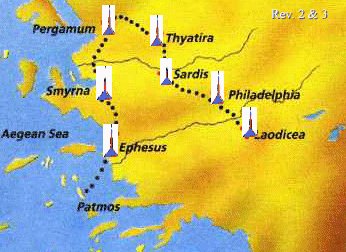
Elements of True Prophecy
This fivefold formula is important because it is also a revelation showing us the character of Elohim (God) and how He deals with local congregations and the individuals within them. As such, then, it is a test of true prophecy which must contain these elements to be true. There must be pastoral headship (and therefore accountability not only to Yahweh Himself but also to a family head - the father/husband and/or pastor), a clear statement as to the origin of the prophecy, prophetic insight as to what is happening in a congregation's or individual's life containing both praise (where praise is due) and rebuke (where that is due), and a commandment to listen to what the Ruach haQodesh (Holy Spirit) is saying to each individual but specifically to each local family or assembly, and concrete promises to those who overcome or win the victory over temptation and sin.
1. THE CONGREGATION AT EPHESUS
We begin today with the congregation at Ephesus, so if you'll turn with me to chapter 2, we shall read out the first seven verses:
"1 To the malak (messenger, angel) of the assembly (congregation, church) of Ephesus write, 'These things says He who holds the seven stars in His right hand, who walks in the midst of the seven golden menorahs (seven-armed candlesticks or lampstands): 2 I know your works, your labour, your patience, and that you cannot bear those who are evil. And you have tested those who say they are shlichim (apostles, 'emisaries' - HRV) and are not, and have found them liars [1]; 3 and you have persevered and have patience, and have laboured for My Name's sake and have not become weary. Nevertheless I have this against you, that you have left your first ahavah (love). 5 Remember therefore from where you have fallen; repent (make teshuvah) and do the first works, or else I will come to you quickly and remove your menorah (lampstand, candlestick) from its place -- unless you repent. 6 But this you have, that you hate the deeds of the Nicolaitans, which I also hate. 7 He who has an ear, let him hear what the Ruach (Spirit) says to the assemblies (congregations, churches). To him who overcomes I will give to eat from the tree of life (Gen.2:9; 3:22,24), which is in the midst of the Paradise (walled/enclosed/separated Garden) of Elohim (God)'" (Rev.2:1-7, NKJV).
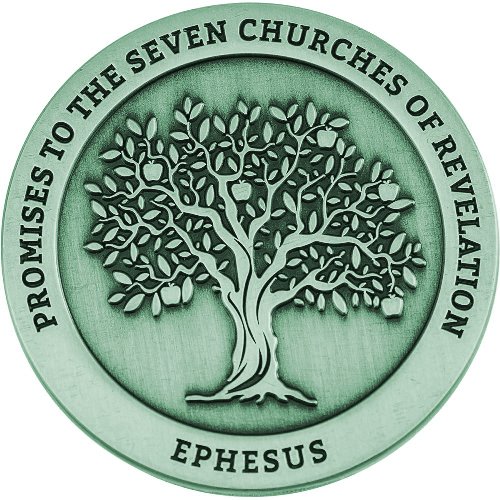
Paul in Ephesus
Before we comment on this, I have to say that in reading this oracle I was immediately reminded of the words of the apostle Paul's own counsel to the qodeshim (saints, set-apart ones) at Ephesus where he had administered extensively before John relocated to the city. The epistle he wrote there 40 years or so earlier gives us important background material, so let's first of all take a look at the first ten verses of chapter 2:
"1 And you (Ephesians) He made alive, who were dead in trespasses and sins, 2 in which you once walked according to the course of this world, according to the prince of the power of the air, the spirit who now works in the sons of disobedience, 3 among whom also we all once conducted ourselves in the lusts of our flesh, fulfilling the desires of the flesh and of the mind, and were by nature children of wrath, just as the others. 4 But Elohim (God), who is rich in mercy, because of His great love with which He loved us, 5 even when we were dead in trespasses, made us alive together with Christ (by grace you have been saved/delivered), 6 and raised us up together, and made us sit together in the heavenly places in Messiah Yah'shua (Christ Jesus), 7 that in the æons (ages) to come He might show the exceeding riches of His grace (undeserved loving kindness, unmerited favour) in His kindness toward us in Messiah Yah'shua (Christ Jesus). 8 For by grace you have been saved (delivered) through emunah (faith), and that not of yourselves; it is the gift of Elohim (God), 9 not of works (deeds), lest anyone should boast. 10 For we are His workmanship, created in Messiah Yah'shua (Christ Jesus) for good works (deeds), which Elohim (God) prepared beforehand that we should walk in them" (Eph.2:1-10, NKJV).
A Matured Conregation
Many of the younger converts in that congregation would have had children and grandchildren by the time John wrote, and maybe even some great grandchildren. A lot of water has gone under the bridge, a lot has happened, two more generations have come into the world, and as a congregation it will have considerably matured. Perhaps a majority in John's time hadn't even met Paul but his letter to them would most assuredly have been both known and cherished. It's clear that the Ephesians have been through a lot
A Founding Colony
Of the seven assemblies in Asia this was the only one (that we know of) to whom Paul had personally sat down and written a letter. And as we have seen in that brief extract, it contains some of the most sublime and important truths about the doctrines of grace and salvation. So it should be interesting to discover where, in the course of 40 years, the Ephesians had succeeded and where they had failed, since theirs was essentially a mother or founding colony for the rest of the congregations in the area. This would have been, to use orthodox Christian parlance, a 'bishopric' or central assembly for the region of western Anatolia. No doubt this is where important gatherings of believers from the whole region were drawn and came to hear the wisdom of its patron and patriarch, John himself. Both in Paul's day and in John's, the Ephesian congregation is commended for its endurance and non-tolerance of wicked and deceitful persons. Since Ephesus heads up the other six, it is accordingly a showpiece of sorts and example for the others, and it is natural that Yah'shua (Jesus) starts with it.
An Important Metropolis
But before we go any further, we need some idea of what first century Ephesus was like for these believers. This was one big city, even by our standards today. It had a huge amphitheatre, the remains of which can be found today in modern Turkey. You can go and see the gladiators' graveyard which gives you an idea of how some of the population spent their free time. Like any metropolis, the city was full of streets, houses and shops. Ephesus was the home of the Temple of Artemis, the Greek name of the Roman goddess Diana, and one of the 'wonders' of the ancient world. Ephesus was that cult's centre or 'Vatican City'. And the Romans, when they established temples dedicated to the city of Rome and to the emperor, did so carefully within the very precincts of Artemis herself.
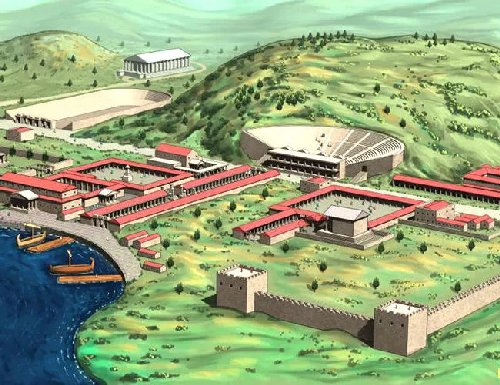 Ancient Ephesus, metropolis and cult centre of Artemis
Ancient Ephesus, metropolis and cult centre of Artemis
The Christian Jewel of Anatolia
Scholars believe that ancient Ephesus had a population of about 250,000 or a quarter of a million. It was the local capital, and the most important city in the whole of Anatolia. This would then have been the equivalent of a modern Los Angeles in California. This isn't some small, insignificant, remote place in the Roman Empire. Indeed, Ephesus became one of the major centres of early Christianity and by the 2nd century AD this place was held up by writers of the time as a great example of the Christian or Messianic faith, life and witness. It was held in such high esteem that the 5th century Council of Ephesus was held there in AD 431. If you had told believers in the first five centuries that 1,500 years later, in our 21st century, there would be no churches there, no believers, no pagans, and no standing buildings at all, they would have looked at you incredulously. That would have seemed to them as absurd as someone being told today that one day in the future the Vatican (the headquarters of Catholicism) or Canterbury Cathetral (the headquarters of the Church of England) would one day be lying in ruins with no Christians to be found anywhere.
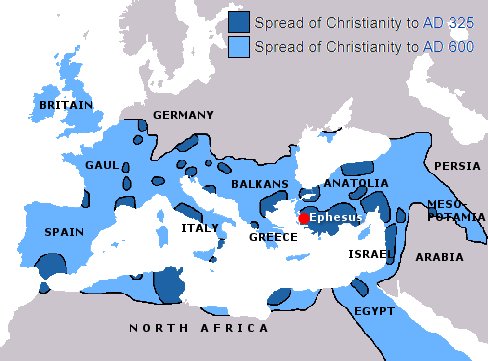
Anyone Can Choose to Fall
Yet this is precisely what Yah'shua (Jesus) warned the Ephesians of in Revelation 2:5 - "If you don't repent, I will come and remove your lampstand out of its place" (KNT). That's a severe warning. You see, this can happen to the most devout and faithful believer too if he or she isn't very careful indeed, let alone to a whole congregation. This sharp and pointed message, not just to Ephesus but to all seven congregations in the area, and by extension, to all other congregations then and now, and to all believers generally in every age, must not be treated lightly. I have seen so many strong, professing Christians and Messianics lose their hope and faith and descend into darkness and, in one or two cases, their sanity.
No 'Once Saved, Always Saved'
I repeat again, and most emphatically, there is no such thing as 'once saved, always saved'. No-one is given that assurance or guarantee, nor is it true what the Calvinists claim in their twisted, perverted teaching, that such a believer could not, then, have been saved in the first place. The saved can, and do, fall and cease being saved if they choose to, if enough doubt is allowed to accumulate over time. It rarely happens all at once and during that time, the patience and grace of Yahweh is operating. Our assurance comes in the decision to persist in continuing to work out or salvation on a daily basis (Phil.2:12).
There is No Compulsion in Believing
No one is a prisoner of the Gospel, no one is compelled to believe as the Calvinsits teach, there is no 'irresistable' grace, an oxymoron if ever there were one. No church, congregation or ministry is assured perpetual existence because the faith and good works of its founders. Ephesus was once mighty and great in the faith but is no more. You will see the centres of many great denominations crumble into ruins in the years ahead or otherwise become monuments to dead religion. And remember this too: you are no more born into faith, because your parents were believers, than Jacob was born Israel. The faith that you have or don't have is what you choose or don't choose. You are a complete free agent and can either choose eternal life, on the terms it is given, or condemnation. History is its own witness of the crazy choices people make. Insanity does grip people sometimes as they knowingly choose destruction out of some misguided loyalty or a last desperate act of defiance. No one is forcing you to be condemned. And if you are pretending at faith, it will be exposed at the last day.
The Council of Ephesus and the Nestorian Heresy
It is perhaps hard to believe, given its excellent credentials in John's day, that the Ephesian messianic community (church) eventually lost everything. But you only have to examine what happened at the Council of Ephesus in AD 431 [2], some 3§ centuries after the Book of Revelation was written, to see the fate of the simplicity of the Gospel by that time. It was convened to resolve the so-called 'Nestorian heresy' which I don't particularly want to get into in any depth today as Nestorius, the Bishop of Constantinople, taught both true and false doctrines. And is so often the case, one group of believers with a mixture of true and false beliefs triumphs over another group of believers with a different set of true and false beliefs. The Council met chiefly to confirm the earlier Nicene Creed which maintained, amongst other things, that:
- 1. Mary (Miriam), the mother of Yah'shua (Jesus), was Theotokos or 'God-bearer' (the one who gives birth to God - hence the Catholic title, 'Mother of God' [3]) and not, as Nestorius claimed, Christokos or 'Christ-bearer' (the one who gives birth to Christ); and
- 2. The Hypostatic union was the true doctrine, namely, that Messiah is one person with two natures (human and divine) and not two separate persons as Nestorius (and later the Persian Church which went Nestorian, under political pressure from the ruling Zoroastrian rulers) maintained.
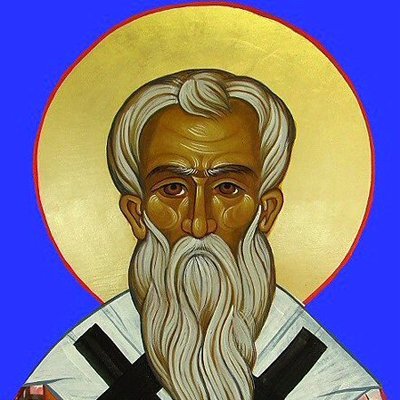 Nestorius
Nestorius
An Overcomer is a True Israelite
My only point in raising this historical curiosity is to make you aware that by the 5th century, many generations later, the Ephesian believers had become radically transformed doctrinally into an antinomian (lawless) neo-Catholic church. And this is one of the main points of both this passage we are looking at and the whole of the Book of Revelation that speaks 8 times of 'overcomers' and 'overcoming'. The rest of the Messianic Scriptures (New Testament) speaks of 'overcomers' and 'overcoming' 10 times. Understand this: the word 'Israel' literally means 'El (God) overcomes'. A true or authentic Israelite is an overcomer like his forefather Jacob who wrestled with Elohim (God) for a blessing and prevailed, overcomign his carnal nature.
A Gradual Aposatsy
Those who overcome through Messiah are therefore collectively true Israel and each individual overcomer is an authentic Israelite. This means that overcomers are Torah-compliant or obedient as all Israelites are and that all Gentile or non-Israelite converts must become Israelites in roder to fulfil the mitzvah (commandment), repeated 8 times in the Book of Revelation, to become an overcomer - one who conquers the fallen, Adamic, fleshy nature to become spiritual. Ephesian Christianity by the time of the Third Ecumenical Council was not Israelite. It had evolved, through disasterous choices and compromises, a hybrid of Christian and pagan. They had re-absorbed, in small increments so as to be virtually undetectable to themselves, the very pagan philosophy their forefathers had abandoned in Paul's and John's day. They had departed from the faith and were well on their way having their seven-armed menorah (itself a Torah, symbolically depicting truth-bearing Light and the 7 annual festivals, amongst other things) removed from the presence of Messiah. They had been progressively inching their way into a state of apostacy and unbelief. In a word, they were passing into spiritual darkness. The fact that the Council was held in the 'Church of Mary' speaks volumes and gives you some idea of the extent of Mariolatry already present in Christendom in the 4th century.
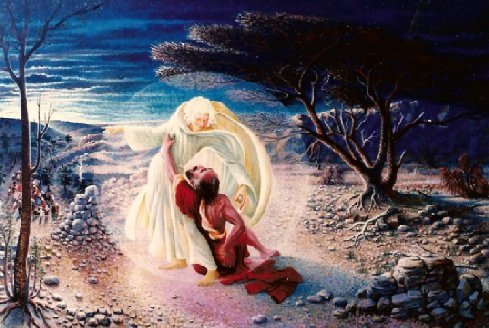 Jacob wrestles with Elohim, overcomes and receives the name Israel
Jacob wrestles with Elohim, overcomes and receives the name Israel
Messages for All Generations
The Ephesian qodeshim (saints, set-apart ones) are promised, interestingly, the right to the 'Tree of Life', much as those in Smyrna will be promised, as we shall see next time, that they will escape the 'second death'. All the promises made to the several congregations, plus all the warnings, are, however, for all the congregations as well as for us. The promises are no less for this generation. Specific ones are mentioned to different assemblies in different situations based on their collective decision-making. Therefore we are to learn from the good and bad choices they made. And John, as their apostle and 'bishop', is aware of the specific difficulties so the local colour of the letters is quite remarkable as we'll see.
The Temple of Artemis & a Tree of Asylum
Let's take Ephesus, which is our case study today. Why, do you imagine, Yah'shua (Jesus) specifically singles out the 'Tree of Life' for mention to the Ephesian believers? You see, the great Temple of Artemis (Diana) had within its extensive grounds a wonderful garden - a kind of pagan version of 'paradise' - which was focussed on a particular tree which was used not only as a sacred shrine but as the focal point of a system of asylum. This tree even featured in some of the local coins. Criminals who came within a certain distance of this tree would be free from capture and punishment. It is no accident, then, that the Johannine letter to the Ephesians, dictated by Christ Himself to John, has a 'Paradise', a beautiful garden with the 'Tree of Life' at its heart.
 The imposing temple of Artemis (Diana) at Ephesus as it would have appeared
The imposing temple of Artemis (Diana) at Ephesus as it would have appeared
Repentance, Chayim, and the The Tree of Life
However, Yahweh's Paradise is not a refuge for unrepentant criminals any more than it is for those who repeat the 'Sinners' Prayer' withour repenting of their sins and leading a qadosh (holy, set-apart) Torah-obedient life. It is the place where those who make teshuvah or 'repent' (v.5) and those who 'overcome' or 'conquer' will have the right to eat to the tree, and to obtain chayim or life of a kind which Elohim (God) always intended His human children to possess but which, until now, they had lost, along with Paradise, because of their sin. The 'Tree of Life' was, after all, there in the original Gan Eden or Garden of Eden (Gen.2:9; 3:22), and will be there, planted many times over, in the 'Garden City' which is the New Jerusalem which we will come to learn more of later in Revelation, chapter 22 (v.2) at the end of our study.
Yah'shua's Delight With the Ephesian Believers
But let's not lose sight of the overall picture in focussing on some very interesting, if important, details. The letter is to Ephesus, the centre of imperial power in the region, and its message is that Yah'shua (Jesus) is the Sovereign-One (not Caesar) who holds the seven stars in His right hand. And when Yah'shua (Jesus) looks at the Ephesian believers He is delighted! They have worked hard, they have been patient even under threat and persecution (v.3), and they have drawn a clear line between those who are really following Christ and those who are not (v.2) as you would expect of a mature and seasoned congregation that was the very first apostolic planting in the region. They are the example the daughter congregations - the later plantings - are to follow, which is what a bishopric or 'mother colony' is all about, to use our own jargon.
False Lawless Traveling Apostles & Teachers Overturned
Indeed, we read, there were some people who had arrived at the Ephesian assemblies who tried to pass themselves off as bona fide, authentic, shlichim, emisaries, apostles, evangelists or witnesses of Christ but who weren't, and these mature believers had seen right through them! Not at all unlike today, don't you think, with so many false, lawless, non-Israelite, non-overcoming representors of Christ? We meet them all the time. They're zealous, enthusaistic, and don't regard themelves bound by any law of Torah, only 'the Spirit', as they claim. Now we don't know who precisely these false 'apostles' to the Ephesians were but the historical records show that the earliest believers traveled the commercial routes using the excellent Roman road network, and it's quite likely that a lot of these 'apostles' just turned up in a messianic community and claimed the hospitality of the local assembly as their right and privilege. Oh my, have we met that type of person! - lawless, self-appointed, claiming the right to board-and-lodging because they claimed to be the 'servants of God' on a mission! And what do you know, in the first century they often came with some new fangled 'teaching' to bait the hard-working believers who were accustomed to showing hospitality to true apostles like Paul and John! These false witnesses, unwilling to work for their living, chose instead to exploit the hard labour of true believers whose lifestyle was their principle witness to their neighbours.
 False traveling apostles, evangelists and teachers plagued Ephesus
False traveling apostles, evangelists and teachers plagued Ephesus
Exposing False Wandering Teachers and Evangelists
Well, the Ephesian qodeshim (saints, set-apart ones) would have none of it. They heard them out, initially showed them hospitality, but once they discerned what they were really up to, called them to repentance and threw them out if they would not. We have had many such 'wandering ministers', unaccountable to anyone but themselves, drop in on us over the years. We have shown them hospitality but seeing we were not so easily fooled, they have never since returned. We witness to them, of course, tell them about the fruits of true witnessing, that they have to have a trade as Paul did, so as not to be a burden on their hosts, and that they are to be Torah-obedient. These are so-called (and in reality non-existent) 'solo Christians'. They are their own private churches, congregations and 'assemblies'.
A Strong Delusion
Indeed they 'assemble' here, there, and everywhere without putting down roots and becoming family in the truest, Gospel sense of the word. But the thought of being accountable and rooted is typically anathema to them. They consider themselves 'free' from the 'shakles' of such a Torah lifestyle, to go where they please, do as they want, and speak whatever their heart moves them to speak. And I have heard them prophesy this and prophesy that over the years, most of which were false prophecies. One such 'visitor' prophesied he was called to cross the border to immediaetly preach in a neighbouring country only to find the border was closed because of the Covid-19 lockdowns. On another occasion he said the 'Spirit' had commanded him to visit a certain city to see a certain man only to find, upon arriving, that that man was nowhere to be found as the 'spirit' had predicted. Yet did he repent? Did he acknowledge the had been following a false spirit or his own imagination? No, not at all. Anmd yet this is so typical and common among Pentecostals and Protestants. They simply switch their minds off and pretend that all is well, that they're still 'Spirit-filled', and that their 'tongues-speaking' is proof that all is well with their souls. This, brethen and sisters, is strong delusion (2 Thes.2:11). It's a sign they are spiritually asleep no matter how emotionally-charged they may feel. Emotions are not signs of the presence of the Ruach haQodesh (Holy Spirit) - that's Mormon 'burning-in-the-bosom' theology.
Forgetting Our Original Love
Now, don't get me wrong, there are authentic traveling ministers in our day, as back then too. I think of those children evangelists in China who have converted thousands, for example. There is a delicate balance to be found. And there are all sorts. We must always remember that the heart of the Besorah (Gospel, Good News) is avahah-chesed - loving-kindness and mercy. The Ephesians came to have a problem with this. They were so diligent about being doctrinally correct and exposing false teachers that somewhere in the middle of this they started forgetting to love those who abused them. They were more concerned about being right. They became self-righteous. Yah'shua (Jesus) reminds these seasoned believers that they have "abandoned the love [they] had at the beginning" (v.4, KNT). Now this may refer to Yah'shua (Jesus) Himself - we can, and sometines do, get so absorbed with the ministry that we forget Him. But I think in the Ephesian situation the finger is being pointed here is at their behaviour for the Saviour says: "Repent and do the works you did at the beginning" (v.5, KNT).
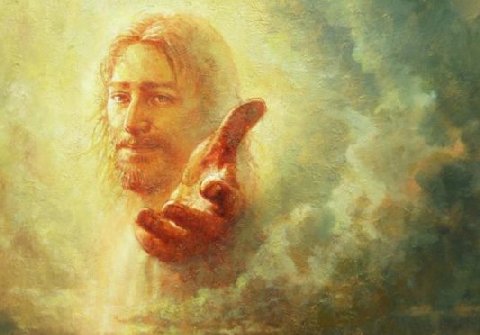 Not forgetting our first love, Yah'shua, and love for the people
Not forgetting our first love, Yah'shua, and love for the people
Tired of the Scammers
Love is, as we know, principally a verb in the Gospel because it's something you do, giving hospitality and practical help to those in need, particularly to other believers who are poor, sick, or hungry. That was the chief mark of the early messianic community (church) and I confess that there are times when I get so fed up with those who have exploitedor scammed me for for what are very limited and hard-found resources that I may on occasion close my heart to those who are genuine and assume their motives are all the same. We all get 'burned' but that doesn't mean we should fall into the trap of believing that 'once burned, always burned', or 'don't trust anyone anymore. We must forgive and trust again but this time with a more careful eye.
The Best Advertisement of the Faith is Love
You see, no other non-ethnic group in all history had believed the way the first Christians/Messianics did. It was their chief visible hallmark to the unbelieving world. Love of this kind - the kind that gives freely to others - reflects Yahweh's own self-giving love for His faithful talmidim (disciples), and self-giving on the part of talmidim (disciples) was, and is, and always will be, the best expression of, and the best advertisement for, faith in this Elohim (God). I suspect this is where these seasoned veterans had gone wrong, lost their way, and it's so easy to do. When you've been scammed so many times by false believers it's all to easy to withdraw and trust noone who comes to you. But at the tsame time we are not to indiscriminately throw away precious and scarce resources to deceivers when there are genuine folks all around who genuinely need mercy. It's so easy to let slip and think to oneself, when someone comes asking for help, 'Uh oh, another scammer'.
Counsel for All Ages
It's all too easy to settle down into a vaguely comfortable existence which puts its own needs first, and sometimes, last as well. The Ephesian congregation needed to wake up, to remember how things used to be, to repent and get back on track. We have fallen into this trap ourselves at times, again showing how these seven letters are applicable to all believers in all ages when they may succumb to particular temptations or fall into certain spiritual ruts.
Discipline Must Be Followed Up by an Increase in Love
Notice how Yah'shua (Jesus) sandwiches this major critcism between two sets of positive features about the Ephesian qodeshim (saints, set-apart ones) - He doesn't end His letter on a negative note, and nor should we. Good parents know how to do this with their children in order to encourage them when they make mistakes - strict discipline must always be followed by an increase in love. The same is true of the pastors of congregations - remember, each letter is addressed to the pastor or messenger of each assembly (the 'angels' in most English translations). I'm referring to the Ephesians' refusal to tolerate the 'Nicolaitans' who crop up a second time in the letter to those at Pergamum (v.15). So who were they?
The Nicolaitans
The Nicolaitans were an heretical sect within the messianic community (church) that had worked out a compromise with the pagan society in which they lived. They were religious syncretists playing a double-handed game. They apparently taught - now listen to this well! - that the spiritual liberty or freedom given them by Christ gave them suffient leeway to practice and immorality and so become lawless. All sorts of heresies have been born out of this carnal lie, from the common pick-and-choose which commandments you want to follow (and ignore all the rest) that is common to orthodox Christianity, to wanton sinning because by this means, it is claimed, grace flows more abundantly. Paul specifically condemns this thinking (Rom.6:1). But grace is for the repentant, those who abhor sin, who hate lawlessness as Elohim (God) does, which Scripture ubiquitously condemns in both Old and New Testaments.
Nicholas, Balaam and Jezebel
Tradition identifies these people with a man called Nicholas, the proselyte of Antioch who was one of the first seven deacons or shammayim in the Jerusalem assembly (Ac.6:5), though the evidence I have to say is circumstantial. A similar group at Pergamum held the teaching of Balaam (vv.14-15), and we are told that some at Thyatira were followers of the woman Jezebel (v.20). All three groups were 'Nicolaitans', sowing discord, corruption and spiritual death into the congregations.
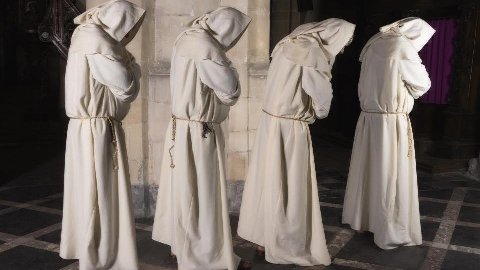 The Nicolaitans were an internal Ba'alist group who got believers to
The Nicolaitans were an internal Ba'alist group who got believers to
compromise with paganism and practice sexual immorality
Familiar Spirits
So in the general sense the messianic community (church) must always be on the look-out for individuals and groups who try to teach strange new ideas and try to introduce strange new practices that contradict the apostolic message. Calvinism is a good example, a heresy first introduced by Augustine that cemented Roman Catholic teaching. Another would be the lawless tongue-speaking of Pentecostals, the false gospel of the Prosperity teachers, and some of the heretical doctrines of the charismatic movement, Mormons, Jehovah's Witnesses, and many, many others. They only cease to be 'strange' to their practitioners through constant repetition and use, becoming 'familiar' because they have become progressively possessed by "familiar spirits" [4] over time. What may come to be seen as 'natural' to us is not necessarily of Elohim (God).
New Revelation Always Builds on What has Already Been Revealed
None of this means that Yahweh doesn't have new revelation and emet (truth) for the messianic community (church) but these things will come from prayeful, authentic Ruach/Spirit-filled study of Scripture, by building on what has gone before, and being true to divine tavnith (pattern), and not through mere innovation or disregard for the mitzvot (commandments).
Overcoming the Flesh and Overcoming Pagan Persecution
Now I have mentioned 'overcoming' and 'conquering' in terms of dealing with the fallen, carnal, fleshy Adamic nature, and that is most certainly a vitally important aspect. But there is more, and specifically within the historic context of Ephesus. By putting together all the references to 'overcoming' in the Book of Revelation, we get a very clear picture of the main challenge that needed to be overcome, namely, the threat of pagan persecution. Indeed, as I hope should be obvious now, these seven letters were written as part of Yah'shua's (Jesus') preparation of these congregations for worse to come. They had already experienced Emperor Nero and (at the time Johyn wrote Revelation) Emperor Domitian but they are not to 'conquer' by fighting back, but by following Yah'shua (Jesus) Himself, who won the victory through His own patient suffering culminating on the cross. We are to follow that example. Some of these congregations in Asia Minor will suffer. Some will die. All must bear patient witness to Yah'shua (Jesus), thereby 'conquering' the evil forces that surround and threaten them.
Ephesus is No More
Ephesus is today a heap of ruins but it survived a long time from its founding in the 10th century BC by Attic-Ionian Greeks. It became Roman in 129 BC and remained Roman for 5 centuries. It was destroyed by the Goths in AD 263, rebuilt again, but as the harbour slowly silted up it became less and less important commercially. Nonetheless, it remained a Greek Christian city of Byzantium until AD 1340 when the Moslem Turks captured it and pillaged the Church of St.John. They deported the Christian inhabitants to Thyrea in Greece and resettled it with Moslems. It was eventually abandoned in the 15th century. Today the ruins sit atop a hill called by the Turks, Ayasaluk. You'll find the ruins of the Temple of Artemis there, the partly reconstructed Library of Celsus, and the Tomb of John the Apostle. But no one lives there. The Ephesians were warned but evetually they turned away from Yah'shua (Jesus) and are no more.
Conclusion
I have long viewed this ministry as an 'Ephesian' work, spiritually, and I believe we possess the same strengths and potential weaknesses as those first Ephesian believers. We are most definitely a 'Johannine community' which you can learn more about on our website. Next week we shall resume, Yah willing, our study of the remaining 6 congregations of Asia Minor. Ephesus is key which is why I have devoted an entire sermon to it today. Until then, may the grace and peace of Yah'shua (Jesus) go with you all. Amen.
Continued in Part 8
Endnotes
[1] This is not, as false teachers amongst some messianics claim, a reference to the apostle Paul (see the Anti-Paulism website), but refers to those who entered the flock after Paul had left Ephesus, as is shown by the fact that these false talmidim (disciples) are in the plural.
[2] Also known as the Third Ecumenical Council
[3] Which also, interestingly and curiously, appeared in the first (1830) edition of the Book of Mormon before its author, Joseph Smith, later changed it to 'Mother of the Son of God' (1 Nephi 11:18) - see the Mormonism website
[4] Leviticus 19:23; 20:6,27; Deuteronomy 18:11; 1 Samuel 28:3,7-9; 2 Kings 21:6; 23:24; 1 Chronicles 10:13; 33:6; Isaiah 8:19; 19:3; 29:4
Acknowledgements
[1] N.T.Wright & Michael F.Bird, The New Testament in Its World (Zondervan Academic, Grand Rapids, MI; 2019)
[2] Tom Wright, Revelation for Everyone (SPCK, London: 2011)
[3] J.B.Phillips, The New Testament in Modern English (1959)
Further Reading
[1] Reconstructing the Johannine Community III: The Three Epistles
[2] Sukkot 2023 I: The Seven Ephesian Sleepers
 Click the image for the whole Series
Click the image for the whole Series

 V322
V322
|


